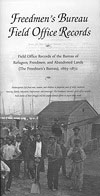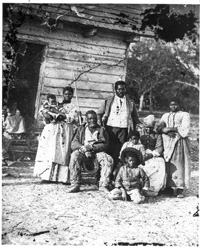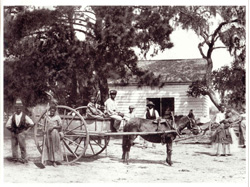The Freedmen's Bureau, 1865-1872
 View or print this Freedmen's Bureau brochure in PDF format
View or print this Freedmen's Bureau brochure in PDF format ![]()
"...an unequaled wealth of information that extends the reach of black family studies and social history"
 Select Images from Freedmen's Bureau Records
Select Images from Freedmen's Bureau Records
See Also:
Background
In the years following the Civil War, the Bureau of Refugees, Freedmen, and Abandoned Lands (the Freedmen's Bureau) provided assistance to tens of thousands of former slaves and impoverished whites in the Southern States and the District of Columbia. The war had liberated nearly four million slaves and destroyed the region's cities, towns, and plantation-based economy. It left former slaves and many whites dislocated from their homes, facing starvation, and owning only the clothes they wore. The challenge of establishing a new social order, founded on freedom and racial equality, was enormous.
The Bureau was established in the War Department in 1865 to undertake the relief effort and the unprecedented social reconstruction that would bring freedpeople to full citizenship. It issued food and clothing, operated hospitals and temporary camps, helped locate family members, promoted education, helped freedmen legalize marriages, provided employment, supervised labor contracts, provided legal representation, investigated racial confrontations, settled freedmen on abandoned or confiscated lands, and worked with African American soldiers and sailors and their heirs to secure back pay, bounty payments, and pensions.
Invaluable Records for Genealogists and Social Historians

Several generations of a family are pictured on Smith’s Plantation, South Carolina, ca. 1862. (Library of Congress)
The records left by the Freedmen's Bureau through its work between 1865 and 1872 constitute the richest and most extensive documentary source available for investigating the African American experience in the post-Civil War and Reconstruction eras. Historians have used these materials to explore government and military policies, local conditions, and interactions between freedpeople, local white populations, and Bureau officials.
These records present the genealogist and social historian with an unequaled wealth of information that extends the reach of black family studies. Documents such as local censuses, marriage records, and medical records provide freedpeople's full names and former masters; Federal censuses through 1860 listed slaves only statistically under the master's household. No name indexes are available at this time, but the documents can be rewarding, particularly since they provide full names, residences, and, often, the names of former masters and plantations.
The Records: A Rich Documentary Source
Headquarters Records
Headquarters Records on Microfilm
These previously filmed series include most records of the Bureau's headquarters in Washington, DC. They document the overall administration of the Bureau, and contain only limited information about particular individuals at the local level.
- Selected Series of Records Issued by the Commissioner of the Bureau of Refugees, Freedmen, and Abandoned Lands, 1865-1872 (M742, 7 rolls)
- Registers and Letters Received by the Commissioner of the Bureau of Refugees, Freedmen, and Abandoned Lands, 1865-1872 (M752, 74 rolls)
- Records of the Education Division of the Bureau of Refugees, Freedmen, and Abandoned Lands, 1865-1871 (M803, 35 rolls)
Headquarters files document the overall administration and operation of the Bureau and its education division and the supervision of state offices. Records include letters, telegrams, and circular letters sent; special orders issued by Commissioner O. O. Howard; annual reports to the President; records relating to appointments; and letters received by the Commissioner. There are summary reports and communications from the state Assistant Commissioners on relief efforts, hospitals and vaccination programs, labor and land issues, legal issues, field office management, and other activities, as well as school reports, schedules of schools, and rental accounts from state superintendents of education. Primarily official and statistical, these records can contain some information on the work and experiences of particular persons at the local level.
State Records on Microfilm
These previously filmed records should be researched for more information on activities at the local level. They provide important details about circumstances and individuals in the localities.
Records of Superintendents
of Education
- Alabama (M810, 8 rolls)
- Arkansas (M980, 5 rolls)
- District of Columbia (M1056, 24 rolls)
- Georgia (M799, 28 rolls)
- Louisiana (M1026, 12 rolls)
- North Carolina (M844, 16 rolls)
- Tennessee (M1000, 9 rolls)
- Texas (M822, 18 rolls)
- Virginia (1053, 20 rolls)
Records of Assistant
Commissioners
Field Office Records on Microfilm
The recently filmed Field Office records are organized by state. They are available on the following National Archives microfilm:
- Alabama (M1900, 34 rolls)
- Arkansas (M1901, 23 rolls)
- District of Columbia (M1902, 21 rolls)
- Florida (M1869, 15 rolls)
- Georgia (M1903, 90 rolls)
- Kentucky (M1904, 133 rolls)
- Louisiana (M1905, 111 rolls)
- Maryland/Delaware (M1906, 42 rolls)
- Mississippi
- Missouri (M1908, 24 rolls)
- North Carolina (M1909, 78 rolls)
- South Carolina (M1910, 106 rolls)
- Tennessee (M1911, 89 rolls)
- Texas (M1912, 28 rolls)
- Virginia (M1913, 203 rolls)
State Records of Assistant Commissioners and Superintendents of Education
These records contain copies of letters and annual reports sent to the Commissioner in Washington; narrative weekly and monthly summaries of problems and developments in the state; letters received from subordinates in field offices; telegrams and issuances (general orders, circulars, and special orders) received from Washington; narrative reports from subordinates on such topics as condition of the destitute, misuse of public stores, status of Bureau property, abandoned and confiscated lands, murders and outrages, and other areas of concern; form reports on schools; labor and personnel records; returns of medical officers; letters sent; and miscellaneous records relating to other topics. While most of these records are summaries and reports, many, such as collected labor contracts and letters received, can provide detailed information on individuals.
Field Office Records 
It was through the local offices that subassistant commissioners, superintendents, agents, claims officers, clerks, provost marshals, disbursing officers, and medical officers provided direct assistance to and had direct contact with freedpeople.
The field office reports, letters received and sent, contracts, certificates, registers, censuses, affidavits, and other documents preserve, directly and vividly, the experiences and circumstances of the individuals involved: freedpeople, Bureau officers, landowners and employers, and others. They contain desperate pleas for food, clothing, and medical care from rural communities; freedpeoples' testimonies about delinquent employers, continued use of forced labor and apprenticeship, violence, and restrictions due to the new state-legislated and repressive "black codes"; petitions for new schools, legal aid in courts, and protection from violence; applications for land; and marriage certificates. These records are filled with names and personal information, whether in marriage certificates, labor contracts, hospital records, complaints, relief rolls, or trial summaries. Further, many of these records preserve firsthand descriptions of the harsh and racially divisive conditions in which these named individuals struggled to establish families, train and educate themselves, and live in self-sufficiency and freedom.
Marriage Records 
Marriage Records on Microfilm
- Marriage Records of the Office of the Commissioner, Washington Headquarters of the Bureau of Refugees, Freedmen, and Abandoned Lands, 1861-1869 (M1875, 5 rolls)
This microfilm series contains hundreds of marriage records of newly liberated African Americans in the post-Civil War era collected from 1861 through 1869 first by the Union Army and then the Freedmen's Bureau in its field offices in the Southern States and the District of Columbia, and sent to the Washington, DC, headquarters. Record types include unbound marriage certificates, marriage licenses, monthly reports of marriages, and other proofs of marriages. Record type and quantity varies with each state.
Freedmen's Branch, Office of the Adjutant General 
Adjutant General's Office Records on Microfilm
-
Records of the Field Offices of the Freedmen's Branch, Office of the Adjutant General, 1872-1878
(M2029, 58 rolls).
The records of the Freedmen's Branch of the Adjutant General's Office (1872-78) contain valuable genealogical information on black soldiers and sailors found in documents and letters they submitted for bounty, pension, arrears of pay, commutation of rations, and prize money. The branch continued the work of the Freedmen's Bureau in receiving, passing upon, and paying military claims. Other documents include letters sent, lists and registers of claimants, reports of persons and articles hired, returns of public property, and affidavits. The records can be useful when used in conjunction with military service and pension records. The records are from field offices in Charleston, SC; Fort Johnston, NC; Louisville, KY; Fort Macon, NC; Fort Leavenworth, KS; Fort Monroe, VA; Memphis, TN; Nashville, TN; Natchez, MS; New Orleans, LA; St. Louis, MO; Savannah, GA; and Vicksburg, MS.
Where to View Microfilm
Copies of field office records microfilms are available for viewing at the National Archives Building in Washington, DC, and at each of the regional archives.
Regional Archives Locations by State/Territory
How to Order Microfilm Rolls

Freedpeople working at the James Hopkinson plantation at Edisto Island, South Carolina. (NARA 64-CN-8971)
- Online: Go to the National Archives online ordering.
- Telephone: Credit card orders call toll free 1-800-234-8861 (301-837-2000 in the Washington, DC, metropolitan area), 8 a.m. - 4:30 p.m. EST. Visa, MasterCard, American Express, and Discover are accepted.
- Fax: Fax your order to 301-837-3191.
- Mail: Mail checks or money orders to the National Archives Trust Fund, P.O. Box 100793, Atlanta, GA 30384-0793. Include daytime telephone number with order.
Please identify the microfilm publication number (e.g., M1875) and the specific roll number(s) you are interested in.
Prices
Black-and-white microfilm is $65 per roll for domestic orders and $68 for foreign orders; shipping and handling fees are included.
For information about specific rolls
View introductions, listings of roll contents, and descriptions of the record series for all Freedmen's Bureau microfilm:
- through the National Archives online ordering
- through links on this web page to the descriptive pamphlets for microfilm publications
- at the start of each microfilm roll
- in a free printed descriptive pamphlet available for each series by calling toll free 1-866-325-7208.
Contact Us
By e-mail at: http://www.archives.gov/contact/
PDF files require the free Adobe Reader.
More information on Adobe Acrobat PDF files is available on our Accessibility page.